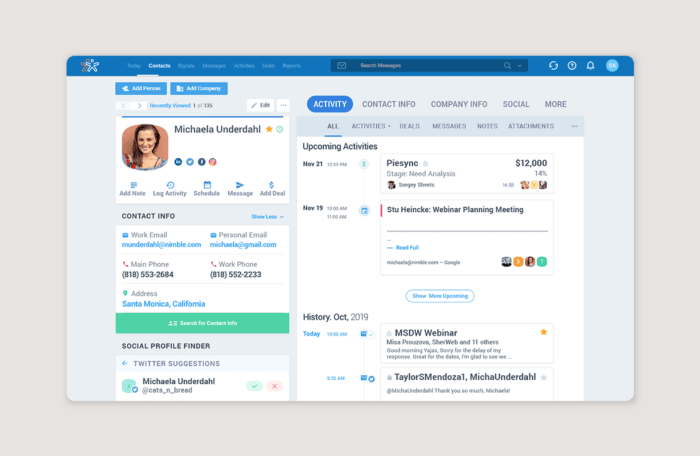In today’s competitive landscape, accounting firms need more than just a keen eye for numbers. Efficiency, client relationship management, and a proactive approach are crucial for growth and sustained success. This is where CRM software for accountants steps in, offering a powerful solution to streamline operations and elevate client interactions.
Understanding the Need for CRM in Accounting: Crm Software For Accountants
Accountants handle sensitive financial data and maintain complex relationships with clients, often juggling multiple projects and deadlines simultaneously. Traditional methods, like spreadsheets and email, can quickly become overwhelming, leading to missed deadlines, miscommunication, and ultimately, dissatisfied clients. A robust CRM system provides a centralized hub to manage all aspects of client interactions, from initial contact to ongoing service.

Source: hashmicro.com
Key Benefits of Implementing a CRM for Accounting Firms:, Crm software for accountants
- Improved Client Relationship Management: Track client interactions, preferences, and communication history in one place, fostering stronger, more personalized relationships.
- Enhanced Communication and Collaboration: Streamline communication through integrated email, messaging, and task management features, reducing errors and improving response times.
- Increased Efficiency and Productivity: Automate repetitive tasks, such as scheduling appointments and sending reminders, freeing up valuable time for higher-value activities.
- Better Organization and Data Management: Centralize client data, documents, and financial information, ensuring easy access and reducing the risk of data loss.
- Improved Client Onboarding: Simplify the client onboarding process with automated workflows and personalized welcome packages.
- Data-Driven Insights: Leverage reporting and analytics features to gain valuable insights into client behavior, service performance, and overall business trends.
- Increased Revenue and Profitability: By improving efficiency and client satisfaction, a CRM can contribute to increased revenue and profitability.
Choosing the Right CRM Software for Your Accounting Practice
Selecting the right CRM software requires careful consideration of your firm’s specific needs and size. Look for features that align with your workflow and budget. Some key factors to consider include:
Essential Features to Look For:
- Contact Management: Robust contact management capabilities, including the ability to store detailed client information, communication history, and relevant documents.
- Task Management: Features for assigning and tracking tasks, setting deadlines, and monitoring progress on client projects.
- Document Management: Secure storage and management of client documents, such as tax returns, financial statements, and contracts.
- Reporting and Analytics: Dashboards and reports to track key performance indicators (KPIs), client engagement, and revenue generation.
- Integration with Accounting Software: Seamless integration with your existing accounting software (e.g., QuickBooks, Xero) to streamline data flow and reduce manual data entry.
- Client Portal: A secure online portal for clients to access documents, communicate with your firm, and view their financial information.
- Mobile Accessibility: Access to the CRM system from mobile devices for on-the-go management.
- Security and Compliance: Robust security measures to protect sensitive client data and ensure compliance with relevant regulations (e.g., GDPR, CCPA).
Popular CRM Software Options for Accountants
Several CRM platforms cater specifically to the needs of accounting firms. Some popular choices include:
- Zoho CRM: A comprehensive and affordable CRM with strong customization options and integrations.
- Salesforce: A powerful and scalable CRM solution, ideal for larger accounting firms with complex needs. It can be expensive though.
- HubSpot CRM: A user-friendly CRM with a free plan and robust features for marketing automation and sales management.
- Freshworks CRM: A versatile CRM known for its intuitive interface and affordable pricing.
- Xero Practice Manager: A CRM specifically designed for accounting firms, integrating seamlessly with Xero accounting software.
Implementing and Managing Your CRM System
Successful CRM implementation requires careful planning and execution. Consider these steps:
Steps to Successful CRM Implementation:
- Define your goals and objectives: Clearly articulate what you want to achieve with your CRM system.
- Choose the right software: Select a CRM that meets your specific needs and budget.
- Data migration: Carefully plan and execute the migration of existing client data to the new CRM system.
- Training and onboarding: Provide thorough training to your team on how to use the CRM system effectively.
- Ongoing monitoring and optimization: Regularly monitor the performance of your CRM system and make adjustments as needed.
Frequently Asked Questions (FAQ)
- Q: How much does CRM software for accountants cost? A: The cost varies greatly depending on the features, provider, and number of users. Some offer free plans with limited features, while others charge monthly or annual subscriptions.
- Q: Can I integrate my CRM with my existing accounting software? A: Yes, many CRM systems offer seamless integration with popular accounting software like QuickBooks and Xero.
- Q: How long does it take to implement a CRM system? A: Implementation time varies depending on the complexity of the system and the size of your firm. It can range from a few weeks to several months.
- Q: What are the key performance indicators (KPIs) to track with a CRM? A: Key KPIs include client acquisition cost, client retention rate, average revenue per client, and sales conversion rate.
- Q: Is CRM software secure? A: Reputable CRM providers offer robust security measures to protect sensitive client data. Look for systems that comply with relevant data privacy regulations.
Conclusion
Investing in CRM software is a strategic move for accounting firms looking to enhance efficiency, improve client relationships, and drive growth. By carefully selecting the right system and implementing it effectively, you can unlock significant benefits and gain a competitive edge in the market. Don’t let outdated methods hold your firm back – embrace the power of CRM and take your practice to the next level.
References
Call to Action
Ready to transform your accounting practice? Contact us today for a free consultation to discuss your CRM needs and find the perfect solution for your firm.
Key Questions Answered
What are the common features of CRM software for accountants?
Common features include contact management, task automation, appointment scheduling, document storage, reporting and analytics, and client communication tools (email, messaging).
How much does CRM software for accountants cost?
Pricing varies widely depending on the features, number of users, and vendor. Expect to find options ranging from affordable monthly subscriptions to more enterprise-level solutions with higher costs.

Source: cloudfront.net
Is CRM software difficult to learn and use?
Most modern CRM systems are designed with user-friendliness in mind. Many offer intuitive interfaces and training resources to help users quickly get up to speed. However, the learning curve can vary depending on the software’s complexity and the user’s technical proficiency.
Can CRM software integrate with my existing accounting software?
Many CRM systems offer integrations with popular accounting software packages. Check with your chosen CRM provider to ensure compatibility with your current setup.
